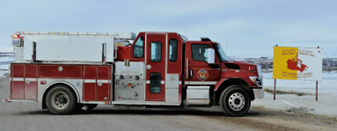Nunavut Fire Marshal’s office
What we do
The Nunavut Fire Marshal’s Office is responsible for fire and building safety. The office develops policies, regulations and programs to promote and enforce the principles and practices of fire safety. We also provide advice on all initiatives and issues concerning building and fire safety.
We are responsible for:
- Promoting and enforcing building and fire safety.
- Advising various levels of government on building and fire-related matters, including fire protection.
- Working with fire service partners throughout the territory.
- Leading, coordinating and providing government departments, hamlets and the public with effective approaches to building and fire safety.
Safety tips
Understanding what to do during a fire is a key step in fire safety. It’s important to establish your safety plan before something happens; prevention is essential for the safety of your family.
 Make a fire safety plan
Make a fire safety plan
All families should have a fire safety plan ready in case of a fire or emergency. This includes knowing what to do during the fire, whom to contact and choosing a meeting point in case family members get separated.
Practice your escape route and be familiar with exit points for every room in the home. Know how to stop, drop and roll.
Don’t forget how to prevent a fire. Know what to do - create a fire escape plan with exit points for every room in your home and always check for the last family member leaving the house. Are all cooking appliances switched off? Are curtains and paper towels far away from burners? Preparing your family for fire safety also means knowing what can start a fire and how to avoid that.
 Check your smoke detectors and extinguishers
Check your smoke detectors and extinguishers
Smoke detectors and fire extinguishers are essential in fire prevention. Have both in your home and office for protection and have them regularly checked by a fire safety professional.
Did you know? You should test smoke detectors once a month and replace the batteries every year. Fire extinguishers should be inspected once a year by a professional.
Make sure all adults and children recognize the sound of a smoke alarm and know what to do in the case of a fire or emergency. This includes knowing the location of the nearest fire escape and emergency numbers so they can call for help.
 When to reach out
When to reach out
Know the fire department’s number in case of a fire or emergency. Stay calm, call and give them your address along with landmarks. Have this number handy so all members of the family can locate it when needed during an emergency. Have everyone in the family practice the phone number to the fire department and know to call it for all fires and fire-related emergencies.
Have questions about public fire education, fire department training and fire prevention? Call the Nunavut Fire Marshal’s Office to get informed at 1-844-975-5493.
 Fire Prevention Week
Fire Prevention Week
Every second week of October, Fire Prevention Week is held to raise fire safety awareness and help ensure your home and family are protected. During this week you can learn from your local fire department about fire safety awareness.
During Fire Prevention Week, team up with your family to complete a fire safety inspection of your home, spot potential dangers, and develop and practice your fire escape plan. Help your family be more confident in the event of a fire or emergency by learning how to react if one occurs.
 Becoming a volunteer firefighter
Becoming a volunteer firefighter
Being a volunteer firefighter isn’t just something you do, it’s something you are. Volunteer firefighters in Nunavut keep the community safe from fire and emergencies, and support with education, fundraising and administration. They are at the core of our communities.

Volunteer firefighters:
- Contribute to their community in a meaningful and invaluable way.
- Provide important emergency services to help people in danger and distress.
- Form lifelong friendships with their colleagues.
- Learn safety and professional skills to help them in other personal or professional settings.
As a volunteer firefighter you will:
- Respond to emergency calls which include fire, rescue and medical emergencies.
- Participate in regular training and maintenance work of the fire station and equipment.
- Participate in public education and support local community events.
Are you ready to become a volunteer firefighter? Visit your local fire hall today.
Resources
Learn how your family can prevent fires and how to escape in the event of a fire or emergency with these resources.
- Nunavut Fire Safety Act
- Nunavut Fire Marshal’s Annual Report
- Safety First, Avoid The Worst (POSTER)
- Fire Prevention: How to stay safe (Fact Sheet)